Edition: 9 to 20 September 2024
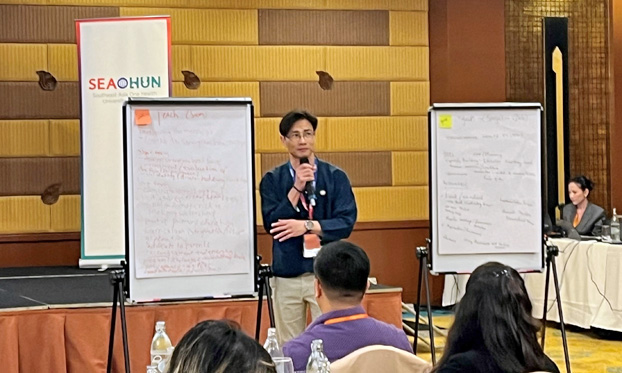 © FAO/Asfri Rangkuti | ASIA AND THE PACIFIC Exploring new partnerships at SEAOHUN 2024
On 17 September, FAO participated in the Southeast Asia One Health University Network (SEAOHUN) 2024 Partnership Meeting and showcased its expertise and One Health initiatives, exploring collaboration opportunities and highlighting areas where its activities align with SEAOHUN’s goals, including the ongoing development of a Memorandum of Understanding (MOU) between FAO and SEAOHUN, which aims to formalize cooperation and create synergies in addressing health challenges at the human-animal-environment interface. This potential partnership is set to enhance coordinated efforts in Southeast Asia and beyond. |
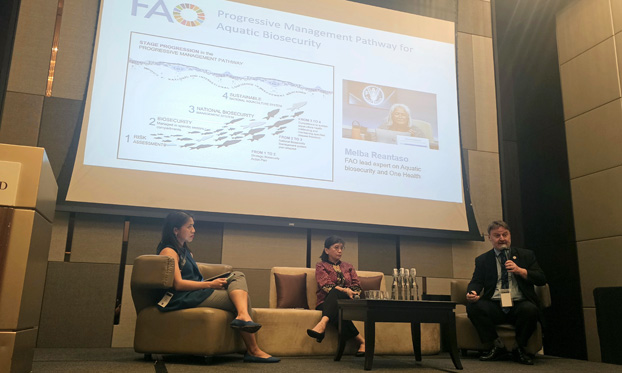 © fao/Roxanne Bunayog | THE PHILIPPINES Highlighting media’s role in One Health FAO, alongside One Health champions in the Philippines, participated in the official launch of the Media for One Health Project in the country, organized by CFI, supported by the French Ministry of Foreign Affairs and CIRAD. This project aims to enhance local journalists' skills in investigative journalism, mobile reporting and fact-checking with a One Health approach and perspective. On 11 September 2024, FAO presented case studies on food safety and security, highlighting challenges on antimicrobial resistance (AMR) and African swine fever (ASF). The presentation emphasized the importance of strategic communication and the role of media in addressing transboundary animal diseases, and bridging scientific research and public awareness. |
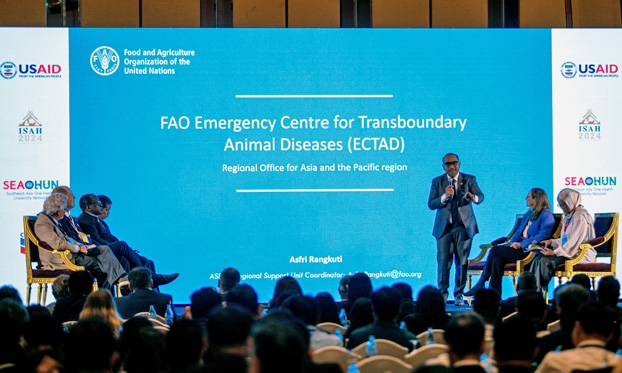 © SEAOHUN | ASIA AND THE PACIFIC Highlighting One Health achievements at SEAOHUN 2024 FAO contributed as a panelist, presenting the organization's key achievements and ongoing initiatives in One Health during the SEAOHUN 2024 International Conference, held from 18 to 19 September. The presentation focused on FAO's success in promoting multisectoral approaches that address complex health challenges involving humans, animals, and ecosystems. FAO’s role in leading One Health efforts was further emphasized, including the critical importance of empowering youth in driving forward One Health efforts and recognizing the next generation’s role in fostering innovation, collaboration, and resilience in addressing global health issues. |
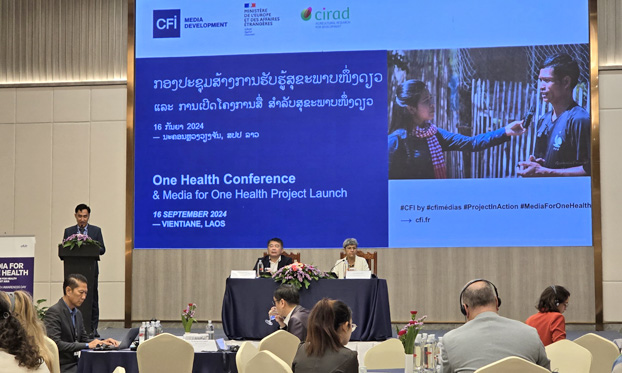 © fao/Bounmee Maokhamphiou | LAO PEOPLE'S DEMOCRATIC REPUBLIC Participating in the One Health awareness day workshop FAO attended the workshop on One Health awareness day on 16 September 2024 in Vientiane Capital. The initiative was organized as part of the regional project in Cambodia, Lao People’s Democratic Republic, the Philippines and Viet Nam on “Media for One Health”, which was implemented by the Canal France International (CFI), in collaboration with the French Ministry of Foreign Affairs and the Centre for International Cooperation in Agricultural Research and Development (CIRAD). Specifically, the workshop aimed to convince decision-makers and representatives from ministries in charge of medical and environmental issues about the importance of the One Health approach and the bridges that can be established between the scientific world and the media world. |
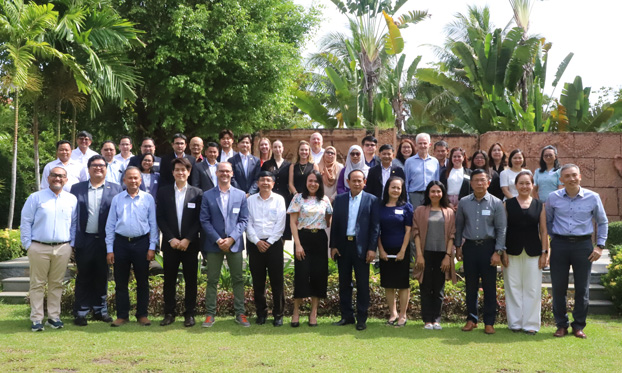 © fao/Ngon Siheng | ASIA AND THE PACIFIC AND CAMBODIA Annual regional coordination workshop for strengthening animal health systems in Southeast Asia and donors’ coordination meeting Following the workshop, the first joint FAO ECTAD and donors’ coordination meeting was held, bringing together representatives from DTRA’s Biological Threat Reduction Program (BTRP), USAID and the Australian Government Department of Foreign Affairs and Trade (DFAT). The meeting focused on sharing information, aligning strategies, and strengthening partnerships to improve coordination across ongoing projects in the region. |
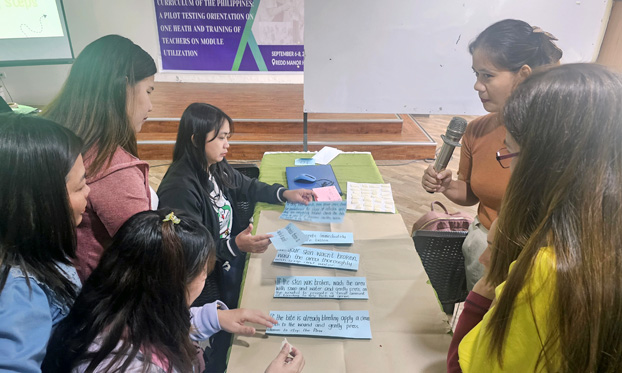 © fao/Roxanne Bunayog | THE PHILIPPINES Collaborative efforts in bringing One Health to the classroom FAO, through the initiative of the Southeast Asian Ministers of Education Organization (SEAMEO) Tropical Medicine (TROPMED) Network in collaboration with the Philippine Department of Education (DepEd), participated in the orientation on One Health and pilot testing of mainstreaming One Health education in the basic education curriculum from 6 to 8 September 2024. This initiative aims to integrate One Health principles into the basic education curriculum. The programme included an orientation for educators and a two-day training on modules developed by SEAMEO and DepEd to teach students about the interconnectedness of human, animal and environmental health. FAO presented the organization’s work, food safety, and food security, highlighting the commitment to addressing transboundary animal diseases and the importance of early education on these topics. |
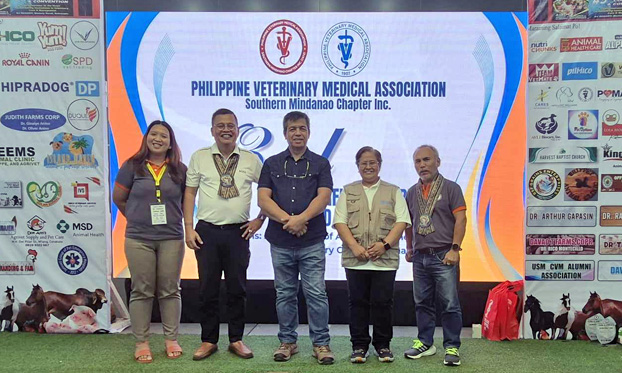 © fao/Aleli Marasigan | THE PHILIPPINES Sharing insights and activities of the Global Health Security Program FAO was invited to present at the Philippine Veterinary Medical Association (PVMA) South Mindanao Chapter Inc. 43rd Scientific Conference and Convention, held from 19 to 20 September 2024. The convention gathered over 110 participants and veterinarians from South Mindanao. FAO presented insights and activities of the Global Health Security Program in the Philippines, highlighting the animal health component. In addition, FAO, through the USAID Global Health Security Project (GHSP), supported the attendance of a resource speaker, who shared valuable experiences of the Mindoro, Marinduque, Romblon and Palawan (MIMAROPA) Initiative’s regional approach to addressing rabies. |
Learn more about our work on partnerships here. | |
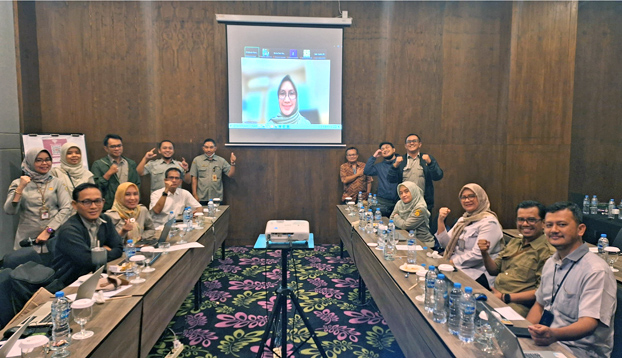 © fao/Ratmoko Saputro | INDONESIA Harmonization meeting for the zoonoses cadre guidelines FAO and the Indonesian Ministry of Agriculture (MoA) hosted a coordination meeting to harmonize the guidance of zoonoses community cadre on 9 September 2024 with related ministries such as Ministry of Health, Ministry of Environment and Forestry, Ministry of Villages, Ministry of Disadvantaged Regions and Transmigration, Ministry of Internal Affairs, and others. Previously, the zoonoses cadre guidelines had already been finalized and aligned with the Coordinating Minister of Human Development and Cultural Affairs regulation No. 7/2022 regarding community-based surveillance. During this workshop, stakeholders provided input on the MoA Zoonoses Cadre and its legal substance, including revisions to the business processes of zoonoses cadres at the district level.
|
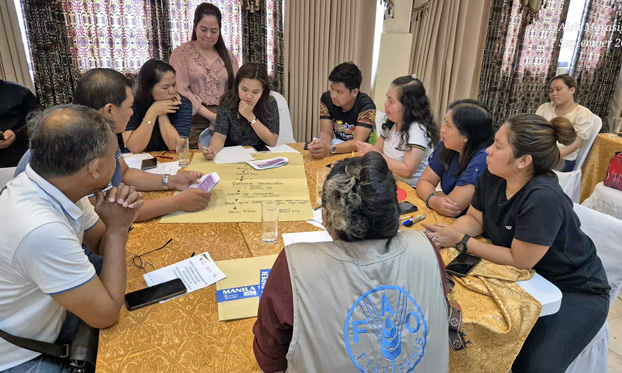 © fao/Aleli Marasigan | THE PHILIPPINES Strengthening preparedness for animal disease outbreaks in the Davao Region FAO served as resource speakers and facilitators in a simulation workshop on animal disease emergencies and response to transboundary animal disease outbreaks, organized by the Department of Agriculture Regional Field Office (DARFO) 11 from 17 to 19 September 2024. The workshop convened 40 participants from various animal health offices across Region 11. FAO delivered key presentations on transboundary animal diseases, laboratory systems, outbreak investigation and risk communication, and facilitated simulation exercises based on novel zoonoses, utilizing the Tripartite’s Joint Risk Assessment Operational Tool (JRA OT). Additionally, participants conducted self-assessments of provincial capacities in One Health coordination, disease surveillance, early warning systems, laboratory systems, risk communication, and human resources with a checklist provided by FAO. This event highlights FAO’s support in strengthening the Philippines’ preparedness and response to potential public health and animal disease threats.
|
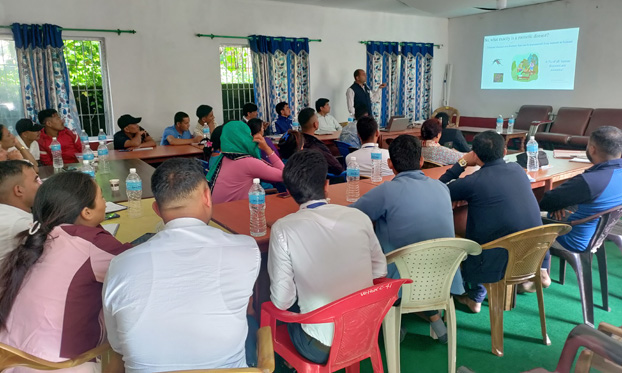 © fao/Nabin Paudel | NEPAL Orientation on prioritized zoonotic diseases and antimicrobial resistance to veterinary paraprofessionals Through USAID, FAO collaborated with the Department of Livestock Services (DLS) and Veterinary Laboratory, Surkhet conducted a one-day orientation training on prioritized zoonotic diseases and antimicrobial resistance (AMR) to animal health paraprofessionals of Rolpa district. The programme was conducted on 18 September where 30 animal health paraprofessionals from local levels and district hospitals participated in the training. The objective of this training was to orient field-level veterinary technicians on prioritized zoonotic diseases and AMR. The participants were also provided with communication materials on rabies, avian influenza and AMR.
|
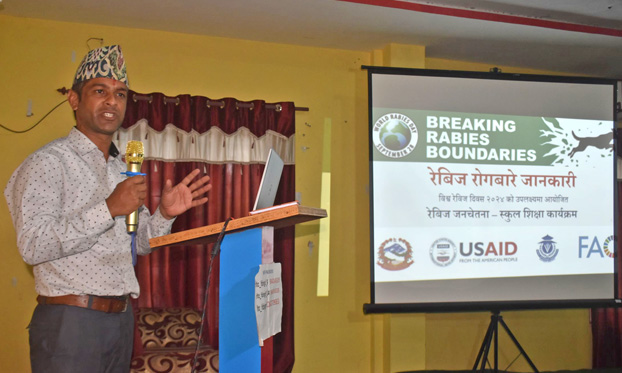 © fao/Surendra Karki | NEPAL Orientation training on rabies prevention and control for school science teachers Together with USAID, FAO supported DLS to conduct a one-day orientation training on rabies prevention and control for school science teachers on 17 September in Dhangadhi. The objective of this training was to provide knowledge on rabies, and the prevention and precaution measures to adopt in post-bite cases to school science teachers, enabling them to educate students and wider community on the importance of rabies and its preventive measures. The training programme was conducted in collaboration with the Veterinary laboratory, Dhangadhi and Veterinary Hospital and Livestock Service Expert Center, Kailali.
|
Learn more about our work on capacity development here.
| |
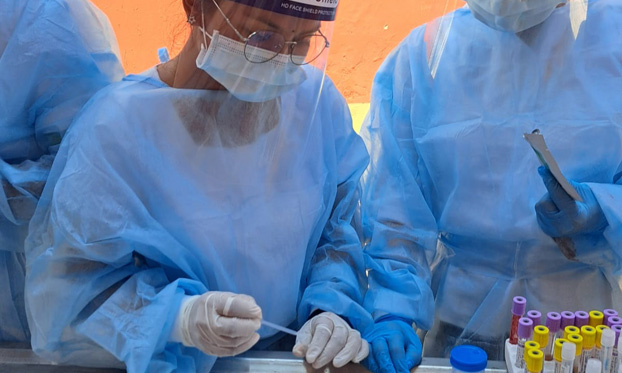 © FAO/Sharmila Chapagain Kafle | NEPAL Sample collection, dispatch and epidemiological reporting training for animal health professionals
FAO, through USAID, conducted a two-day training on sample collection, dispatch and epidemiological reporting in the National Avian Disease Investigation Laboratory, Chitwan. The training was conducted from 10 to 11 September for animal health professionals working at local levels of Chitwan district where 22 personnel were trained. The objective of this training was to equip the animal health professionals working of Chitwan district with hands-on skills of appropriate sample collection, packaging and dispatch of samples for prompt disease diagnosis. The training was conducted in collaboration with the Department of Livestock Services and Central Veterinary Laboratory. |
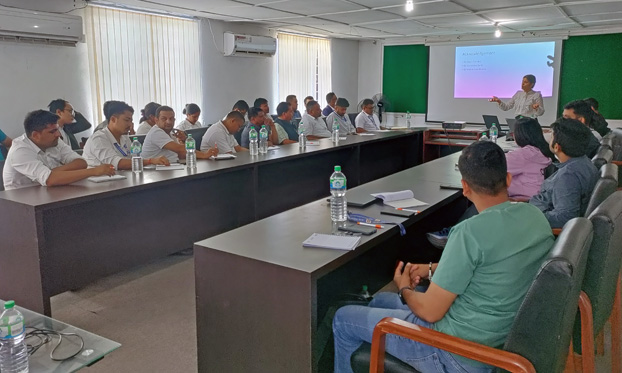 © FAO/Nabin Paudel | NEPAL Laboratory clinical interface workshop
With USAID funding, FAO supported DLS to conduct a one-day laboratory clinical interface workshop in Pokhara. The workshop was conducted on 11 September where 31 officer level animal health professionals working in Gandaki province participated. The objective of this workshop was to raise awareness among animal health officials on the current animal disease status around the Gandaki province, as well as to address concerns regarding antimicrobial resistance observed in veterinary laboratories around the country. The workshop was conducted in collaboration with Veterinary Laboratory, Pokhara. |
Learn more about our work on capacity development of laboratory here.
| |
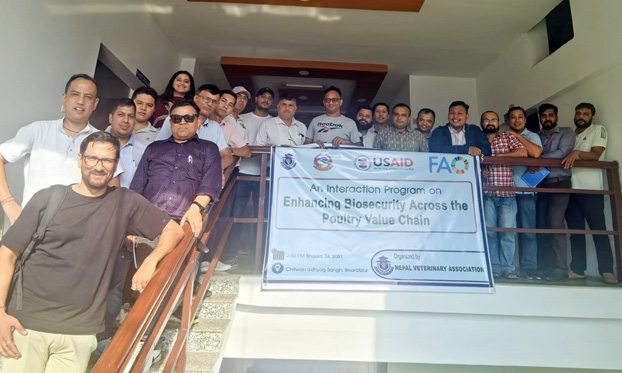 © FAO/Surendra Karki | NEPAL Discussion on enhancing biosecurity across the poultry value chain
FAO, through USAID, supported DLS to conduct a half day discussion programme on enhancing biosecurity across the poultry value chain in Chitwan. The programme, conducted in collaboration with the Nepal Veterinary Association, was held on 9 September where 30 poultry entrepreneurs, large scale poultry farmers and personnel involved in transportation of poultry and poultry products were engaged. The objective of this interaction workshop was to raise awareness of poultry value chain stakeholders regarding the importance of farm biosecurity and proper disinfection to prevent disease spillovers and promote the rational use of antimicrobials. |
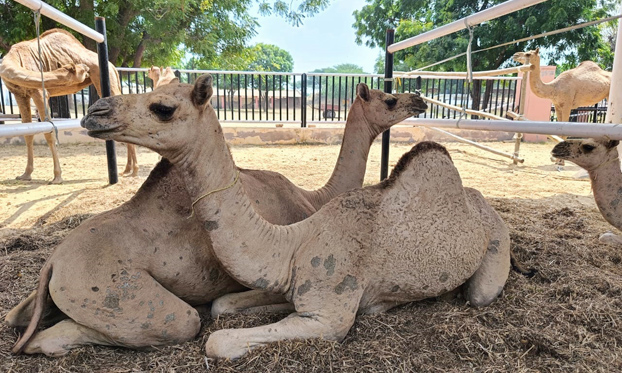 © FAO/M Hasib | INDIA Exploring pathways to revitalize camel milk sector
FAO conducted a two-day scoping visit to the National Research Centre for Camels in Bikaner, Rajasthan from 19 to 20 September. The visit was part of the project, “Establishing Pathways to Integrate the Nutritional and Therapeutic Potential of Non-Bovine Milk,” which aims to develop a nutrition-sensitive camel milk value chain, supporting sustainable production and value-added products. Over the past two decades, the camel population has drastically declined, threatening both their habitats and the livelihoods of communities that depend on them. Through this initiative, FAO seeks to highlight camelids' role in indigenous communities while promoting the sustainability and economic potential of camel milk. |
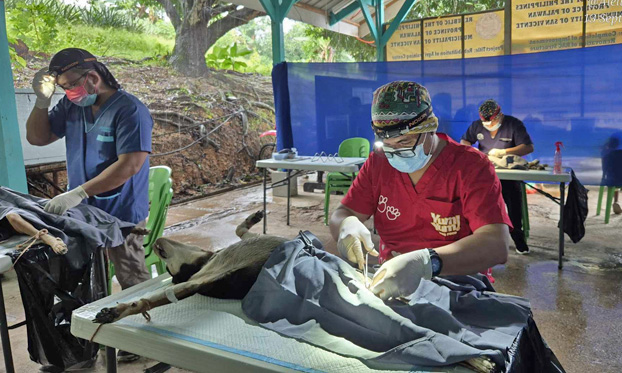 © FAO/Aleli Marasigan | THE PHILIPPINES Supporting rabies elimination in Palawan through the One-Time Big-Time initiative
With support from USAID, FAO participated in vaccination, spay, and neuter activities in the Province of Palawan from 9 to 13 September 2024, as part of the One-Time Big-Time (OTBT) rabies initiative in the MIMAROPA region. Volunteers visited the municipalities of Brooke’s Point and San Vicente and the city of Puerto Princesa, providing free spay and neuter services for more than 250 pets and vaccinating over 2,000 pets. This proactive initiative aims to promote responsible pet ownership, dog population control, and regular rabies vaccination, ultimately curbing rabies cases in the island province and the region. In addition, FAO, with USAID’s support, provided essential supplies, such as syringes and needles. This collaborative effort aligns with United Against Rabies’ Zero by 30 global strategic plan, advancing public and animal health, while ensuring safer communities through effective rabies prevention strategies. |
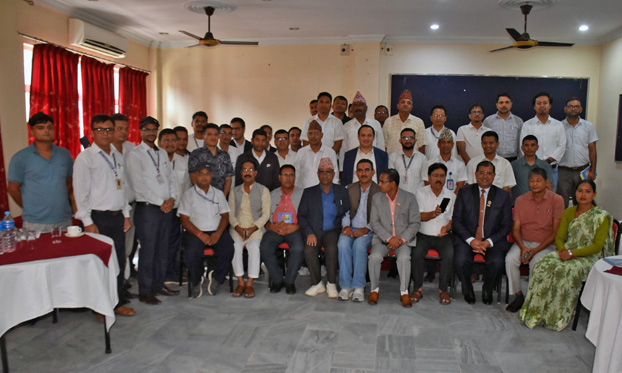 © FAO/Surendra Karki | NEPAL Interaction meeting on rabies with local authorities and One Health stakeholders
FAO supported DLS to organize a multisectoral interaction programme with local authorities and One Health stakeholders on rabies prevention and control in Sudurpaschim province with funding from USAID. The programme was conducted on 18 September and attended by Provincial Agriculture Minister Hon’ble Mr. Bir Bahadur Thapa, Director General of DLS Dr Umesh Dahal and more than 10 Mayors and Deputy Mayors of municipalities from Kailai and Kanchanpur districts. The objective of this interaction programme was to increase awareness among local-level political leadership to take the lead on rabies control activities. The programme was conducted in collaboration with the Directorate of Livestock and Fisheries Development, Sudurpashchim province and Veterinary Laboratory, Dhangadhi. |
Learn more about our work on risk reduction along the value chain here.
| |
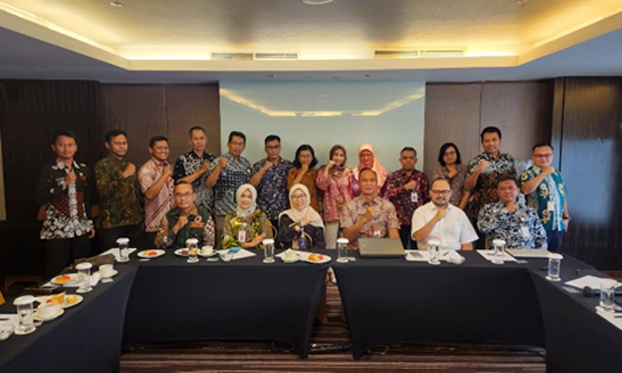 © FAO/Ahmad Gozali | INDONESIA Development of local coordination team to tackle zoonoses and AMR in Yogyakarta From 19 to 20 September, FAO and the Coordinating Ministry of Human Development and Cultural Affairs held a workshop to develop a draft of the local coordination team (TIKORDA) in Yogyakarta Province. TIKORDA aims to enhance government initiatives in multisectoral collaboration, One Health coordination, and addressing zoonoses and antimicrobial resistance (AMR) issues. During the workshop, participants discussed and drafted a Regent's Decree on TIKORDA for Sleman and Gunung Kidul Districts. This decree will provide the legal framework for the establishment and operation of TIKORDA.
|
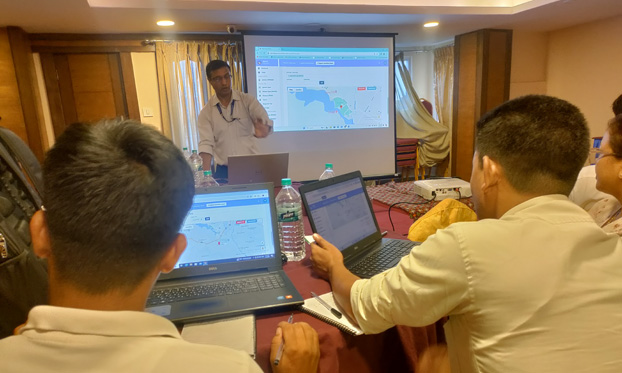 © FAO/Nabin Paudel | NEPAL Training on web-based National Animal Health Information System in two provinces FAO, through USAID funding, conducted eight sessions of orientation training on National Animal Health Information System (NAHIS) for epidemiological reporting for animal health officials working at provincial level, district hospitals and local levels of all eleven districts of Gandaki and ten districts of Karnali provinces. The objectives were to train field-level animal health officials to use the web-based NAHIS software for epidemiological reporting. The training was conducted from 9 to 10 September in Pokhara and from 15 to 16 September in Surkhet where 135 animal health officials were trained. The orientation training program was conducted in collaboration with DLS.
|
| Learn more about our work on surveillance here. | |
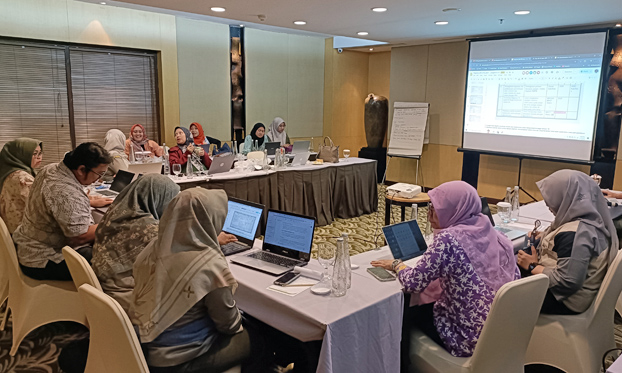 © FAO/Ali Arasy | INDONESIA Joint risk assessment of zoonotic tuberculosis in East Java and Bandung Barat FAO, in collaboration with MoA conducted the joint risk assessment (JRA) on zoonotic tuberculosis (Mycobacterium bovis) at the human-animal-environment interface in Bandung Barat district from 10 to 13 September 2024, and in Malang from 16 to 20 September 2024. This workshop aimed to create a JRA steering committee, lead the technical team, and stakeholders; to identify risk framing, route questions, characterization and design management with communication strategies; and to communicate JRA findings and recommendations to steering committee and stakeholders. Thanks USAID for the financial support.
|
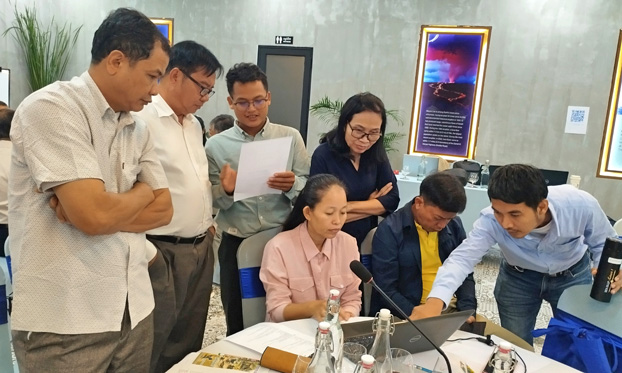 © FAO/Yin Myo Aye | ASIA AND THE PACIFIC AND CAMBODIA Prioritization of animal diseases using One Health tool FAO conducted a training on the One Health Zoonotic Disease Prioritization (OHZDP) process on 17 September 2024. Over the following three days, the national core planning team and facilitators from the General Directorate of Animal Health and Production (GDAHP) and FAO Cambodia and RAP facilitated the animal disease prioritization using OHZDP process. To strengthen animal health capacity and collaboratively address animal health threats, over 50 participants prioritized 10 animal diseases of greatest concern for Cambodia, with funding support from USAID and US CDC’s support in providing materials and access to the online portal for prioritization. Participants discussed the next steps and timeline to expedite the implementation of action plans for prioritized diseases.
|
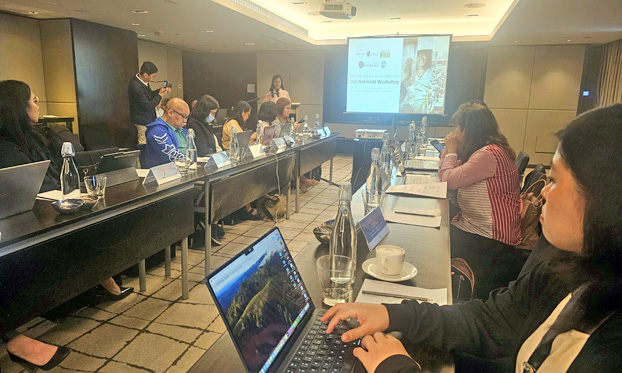 © FAO/Roxanne Bunayog | THE PHILIPPINES Advancing One Health at the 2nd PREZODE and PREACTS Workshop FAO provided valuable technical inputs on food safety, food security and animal health during the second national meeting and workshop for Preventing Zoonotic Disease Emergence (PREZODE) and PREZODE in Action in the Global South initiatives, organized by the University of the Philippines Los Baños School of Environmental Science and Management, in collaboration with CIRAD and the International Livestock Research Institute (ILRI) from 10 to 11 September 2024. The event brought together key representatives and provided a vital platform for collaboration among stakeholders engaged in One Health initiatives.
|
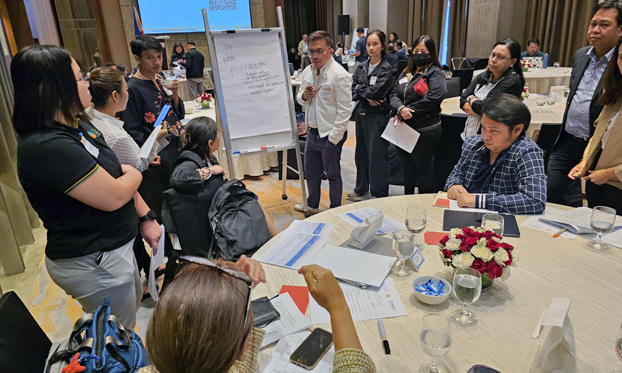 © FAO/Ethel Yap | THE PHILIPPINES Fostering collaboration and exploring legislation for One Health Through the support of USAID and the UK Fleming Fund, FAO and the Philippine College of Veterinary Public Health convened an exploratory meeting on 19 September 2024 at Pasig City, the Philippines, with agencies representing the human health, animal health, and environment sectors. This meeting aims to gather the insights of each industry in crafting the One Health bill and reach a consensus on the potential role of legislation in addressing the current challenges in One Health implementation.
|
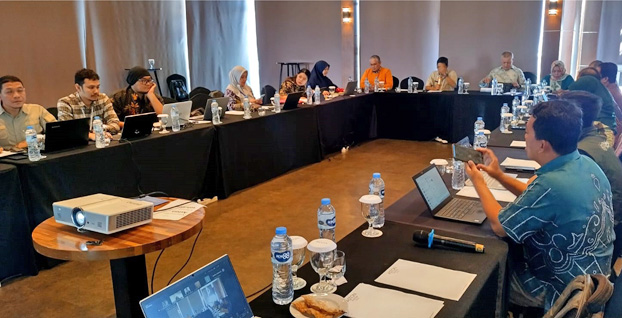 © FAO/Wahid Husein | INDONESIA Finalizing the operational plan for rabies elimination roadmap FAO and MoA conducted a workshop in Bandung, West Java, to finalize the technical operational plan for eliminating rabies from Java Island from 11 to 13 September. The workshop focused on developing a roadmap with specific goals, milestones, indicators, and activities for implementation in Banten and West Java Provinces starting in 2024. Participants discussed the roadmap in detail, focusing on the seven Stepwise Approach towards Rabies Elimination (SARE) components: legislation, prevention and control, surveillance, laboratory diagnostics, information, education, and communication (IEC), dog population management, and cross-cutting issues.
|
| Learn more about our work on One Health here. | |
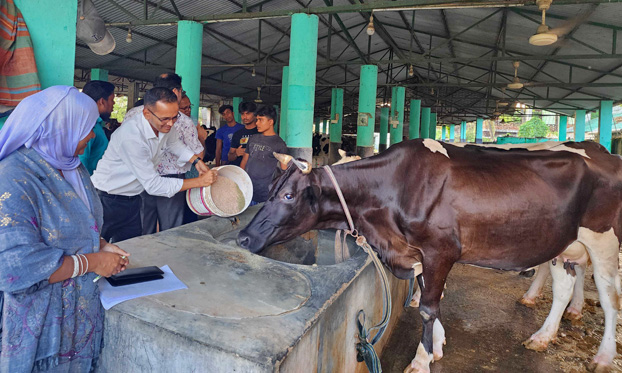 © FAO Bangladesh | BANGLADESH Antimicrobial resistance and antimicrobial use training for veterinary professionals
FAO facilitated a three-day Upazila to Community (U2C) II/Bangladesh AMR Response Alliance (BARA) farmers continuing professional development expansion training to large animal on antimicrobial resistance (AMR) and antimicrobial use (AMU) from 16 to 18 September 2024. The training was funded by the UK Fleming Fund. Twenty veterinarian professionals from government and private sector from upazilas all over Bangladesh participated in this training. The professionals are expected to provide direct training to the local cattle farmers on improving management and using fewer antibiotics on farms, upon receiving this hands-on training. FAO, along with the animal and human health counterparts from the government have been working together since 2016 to reduce AMR risks in Bangladesh. |
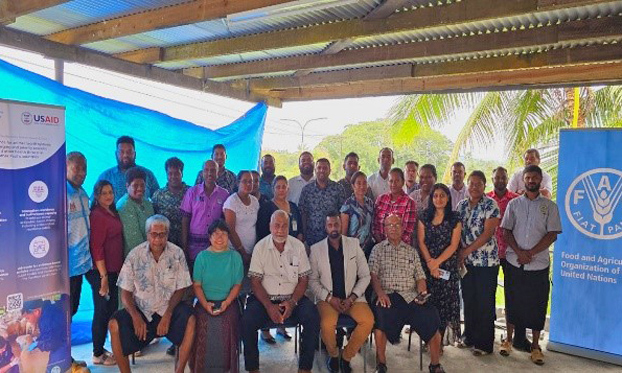 © FAO/Shivani Singh | FIJI Workshop on the One Health approach to AMR management in the Fiji dairy sector
FAO, with support from USAID, held a workshop for animal health professionals working in Fiji's dairy industry from 9 to 10 September to promote the more responsible use of antimicrobials, reducing the threats related to antimicrobial resistance. The goals were to promote best practices in prescribing and administering antibiotics, educate participants on the tenets of antimicrobial use and stewardship, increase awareness of the effects of AMR on animal and public health, and encourage cooperation between veterinary doctors, public health experts, and animal health workers. The workshop was an important step towards a better understanding of AMR and its implications; improved antimicrobial stewardship skills; the creation of action plans within the dairy industry to reduce the use of antibiotics; and strengthened networks for ongoing cooperation and knowledge sharing. |
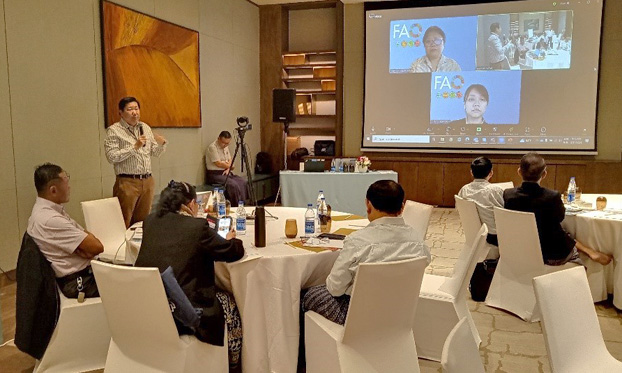 © FAO/Win Thein | MYANMAR Developing the draft AMU surveillance protocol
FAO organized a consultation workshop on the development of the draft FAO Myanmar AMU surveillance protocol on 17 September 2024 in Yango, thanks to USAID for the financial support. A total of 17 key stakeholders from Myanmar veterinary association, Myanmar livestock federation, Myanmar poultry association, Myanmar livestock feed association, animal health products and equipment importers association, pig farmers and processor association and technical experts from the private sector participated in the workshop. |
Learn more about our work on AMR here.
| |
